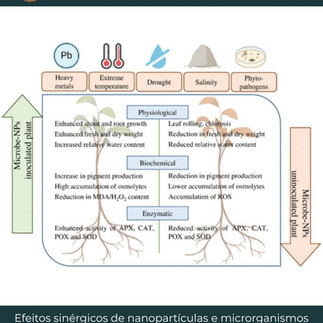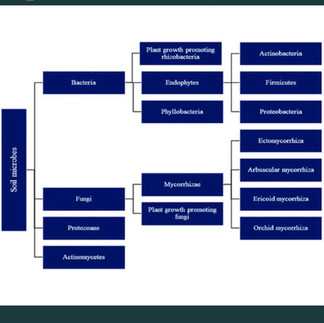Nanotechnology can increase plants' resistance to climate effects
- cbioclimamidia

- Nov 25, 2025
- 2 min read
By Emerson José
A recently published review article in the scientific journal ACS Omega points to a promising path for more sustainable and climate-resilient agriculture by integrating nanotechnology, plant hormones, and beneficial microorganisms. The article, titled "Integrating the nano-phyto-micro triad for sustainable and climate-resilient agriculture," includes the participation of researchers from Unesp and abroad.
The researchers demonstrate that nanoparticles can serve as carriers of plant hormones and bioactive substances, releasing these compounds in a targeted manner in the roots of plants. In parallel, plant growth-promoting rhizobacteria (PGPR) are used to reinforce the overall state of functioning, vitality, and integrity of a plant's roots, increase nutrient absorption, and help the plant withstand environmental stresses (such as drought, high temperatures, etc.).
The union of these three components generates synergies that enhance the delivery of regulatory molecules to plants, while microorganisms help maintain the soil microbiota active and functional, promoting healthier growth and resistance to environmental stress, such as longer periods of drought, temperature variations, and degraded soil.
“The action of microorganisms varies significantly according to the type of soil and climatic conditions. The article presents a description of studies that demonstrate that the performance of beneficial microorganisms strongly depends on environmental conditions,” says researcher Leonardo Fraceto, professor at the Institute of Science and Technology at the Sorocaba Campus of Unesp, coordinator of INCT NanoAgro (National Institute of Science and Technology in Nanotechnology for Sustainable Agriculture) and Innovation Coordinator of CBioClima (Research Center in Biodiversity and Climate Change).
The combination of nanotechnology, plant hormones, and microorganisms creates a synergistic effect capable of improving plant performance, even under drought, heat, or in soils with low fertility. Beyond the immediate impact, the model opens up space for new research, such as testing different nanoparticle compositions, selecting more efficient microorganisms for each crop, and evaluating the adaptation of the technology to specific agricultural systems, considering the challenges of agriculture in the face of the effects of climate change.
Although promising, the strategy is critically analyzed, which highlights the need for more studies, validations under field and stress conditions, as well as ways to transform it into a business model.
Furthermore, Professor Leonardo adds that "the nano-phyto-micro triad model has great potential to significantly reduce the use of fertilizers and pesticides. The article presents multiple evidences and mechanisms by which this integration can reduce dependence on conventional chemical inputs."
The scientific article can be read in full at: https://pubs.acs.org/doi/10.1021/acsomega.5c07151



















Comments